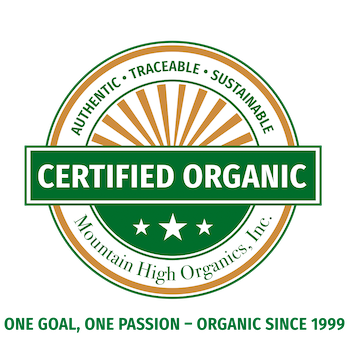
Wholesale – Organic Grains
Packaging Options
Hulled Barley
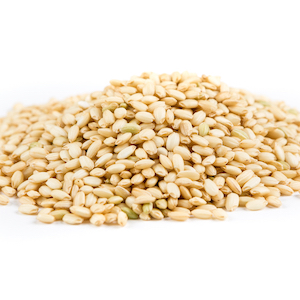 Item Code: 103
Item Code: 103
Hulled Barley has an average length of 0.345 in (8.8 mm). This is covered barely that includes the outer hull. Barley is high in fiber and beneficial nutrients coming from whole grains.
Ingredients: Organic Hulled Barley
Nutrition Information per 100 grams
| Proximates | ||
|---|---|---|
| Energy | kcal | 354 |
| Protein | g | 12.48 |
| Total lipid (fat) | g | 2.3 |
| Carbohydrate, by difference | g | 73.48 |
| Fiber, total dietary | g | 17.3 |
| Sugars, total | g | 0.8 |
| Minerals | ||
| Calcium, Ca | mg | 33 |
| Iron, Fe | mg | 3.6 |
| Magnesium, Mg | mg | 133 |
| Phosphorus, P | mg | 264 |
| Potassium, K | mg | 452 |
| Sodium, Na | mg | 12 |
| Zinc, Zn | mg | 2.77 |
| Vitamins | ||
| Vitamin C, total ascorbic acid | mg | 0 |
| Vitamin A | IU | 22 |
| Folate, DFE | mcg | 23 |
| Lipids | ||
| Fatty acids, total saturated | g | 0.482 |
| Fatty acids, total monounsaturated | g | 0.295 |
| Fatty acids, total polyunsaturated | g | 1.11 |
| Fatty acids, total trans | g | 0 |
| Cholesterol | mg | 0 |

Hulless Barley
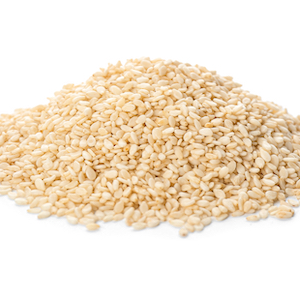 Item Code: 102
Item Code: 102
Hulless Barely contains an outer hull that’s so loosely attached to the kernel that it typically falls off during harvesting. This cuts down on processing and ensures that all of the bran and germ are retained. Actual length of a kernel of barley varies from (4–7 mm) to as long as (12–15 mm).
Ingredients: Organic Hulless Barley
Nutrition Information per 100 grams
| Proximates | ||
|---|---|---|
| Energy | kcal | 354 |
| Protein | g | 12.48 |
| Total lipid (fat) | g | 2.3 |
| Carbohydrate, by difference | g | 73.48 |
| Fiber, total dietary | g | 17.3 |
| Sugars, total | g | 0.8 |
| Minerals | ||
| Calcium, Ca | mg | 33 |
| Iron, Fe | mg | 3.6 |
| Magnesium, Mg | mg | 133 |
| Phosphorus, P | mg | 264 |
| Potassium, K | mg | 452 |
| Sodium, Na | mg | 12 |
| Zinc, Zn | mg | 2.77 |
| Vitamins | ||
| Vitamin C, total ascorbic acid | mg | 0 |
| Vitamin A | IU | 22 |
| Folate, DFE | mcg | 23 |
| Lipids | ||
| Fatty acids, total saturated | g | 0.482 |
| Fatty acids, total monounsaturated | g | 0.295 |
| Fatty acids, total polyunsaturated | g | 1.11 |
| Fatty acids, total trans | g | 0 |
| Cholesterol | mg | 0 |

Pearled Barley
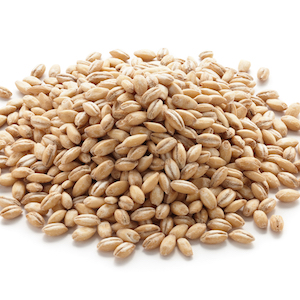 Item Code: 101
Item Code: 101
Pearled Barley is whole grain barley that has had the outer hull removed as well as some of the bran layer. These are circular in shape and are uniform, ivory-colored kernels. Pearled Barley can be used for soups, casseroles, barley risotto.
Ingredients: Organic Pearled Barley
Nutrition Information per 100 grams
| Proximates | ||
|---|---|---|
| Energy | kcal | 352 |
| Protein | g | 9.91 |
| Total lipid (fat) | g | 1.16 |
| Carbohydrate, by difference | g | 77.72 |
| Fiber, total dietary | g | 15.60 |
| Sugars, total | g | 0.80 |
| Minerals | ||
| Calcium, Ca | mg | 29.0 |
| Iron, Fe | mg | 2.5 |
| Magnesium, Mg | mg | 79.0 |
| Phosphorus, P | mg | 221 |
| Potassium, K | mg | 280 |
| Sodium, Na | mg | 9 |
| Zinc, Zn | mg | 2.13 |
| Vitamins | ||
| Folate, DFE | mcg | 23 |
| Lipids | ||
| Fatty acids, total saturated | g | 0.244 |
| Fatty acids, total monounsaturated | g | 0.149 |
| Fatty acids, total polyunsaturated | g | 0.56 |
| Fatty acids, total trans | g | 0 |
| Cholesterol | mg | 0 |

Whole Buckwheat
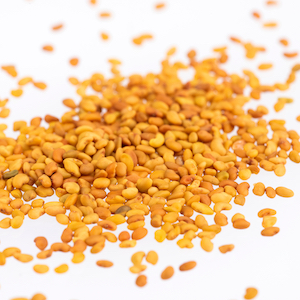 Item Code: 106
Item Code: 106
Whole Buckwheat is a nutritious type of grain that is loaded with vitamins, minerals, and fiber. Whole Buckwheat has a triangular like shape too them. Common uses include salads, soups, breads, or breakfast porridge.
Ingredients: Organic Buckwheat
Nutrition Information per 100 grams
| Proximates | ||
|---|---|---|
| Energy | kcal | 343 |
| Protein | g | 13.2 |
| Total lipid (fat) | g | 3.4 |
| Carbohydrate, by difference | g | 71.5 |
| Fiber, total dietary | g | 10 |
| Sugars, total | g | 0 |
| Minerals | ||
| Calcium, Ca | mg | 18 |
| Iron, Fe | mg | 2.2 |
| Magnesium, Mg | mg | 231 |
| Phosphorus, P | mg | 347 |
| Potassium, K | mg | 460 |
| Sodium, Na | mg | 1 |
| Zinc, Zn | mg | 2.4 |
| Vitamins | ||
| Vitamin C, total ascorbic acid | mg | 0 |
| Folate, DFE | mcg | 30 |
| Vitamin A, IU | IU | 0 |
| Vitamin D | IU | 0 |
| Lipids | ||
| Fatty acids, total saturated | g | 0.741 |
| Fatty acids, total monounsaturated | g | 1.04 |
| Fatty acids, total polyunsaturated | g | 1.04 |
| Fatty acids, total trans | g | 0 |
| Cholesterol | mg | 0 |

Buckwheat Groats / Hulled
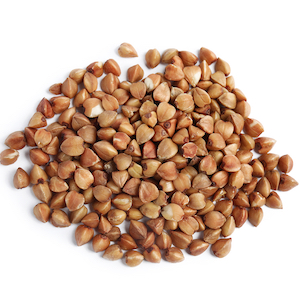 Item Code: 105
Item Code: 105
Buckwheat Groats are the hulled seed of the buckwheat plant. These are around 3.5 mm in length, 3.0 mm in width, and have an angular shape to them. Buckwheat can be found in many soups, salads, or breakfast cereal.
Ingredients: Organic Buckwheat Groats
Nutrition Information per 100 grams
| Proximates | ||
|---|---|---|
| Energy | kcal | 345 |
| Protein | g | 11.5 |
| Total lipid (fat) | g | 3.05 |
| Carbohydrate, by difference | g | 72.04 |
| Fiber, total dietary | g | 5.32 |
| Sugars, total | g | 1.69 |
| Minerals | ||
| Calcium, Ca | mg | 25.5 |
| Iron, Fe | mg | 3.12 |
| Phosphorus, P | mg | 364 |
| Potassium, K | mg | 431 |
| Sodium, Na | mg | 17.8 |
| Zinc, Zn | mg | 2.87 |
| Vitamins | ||
| Vitamin C, total ascorbic acid | mg | 0 |
| Vitamin A | IU | 0 |
| Lipids | ||
| Fatty acids, total saturated | g | 0.56 |
| Fatty acids, total trans | g | 0 |
| Cholesterol | mg | 0 |

Buckwheat Kasha
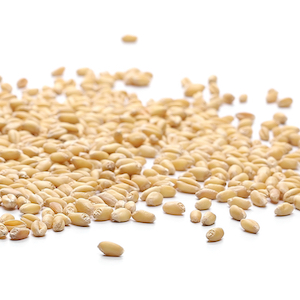 Item Code: 104
Item Code: 104
Buckwheat Kasha is kernels from the buckwheat plant that have been harvested, cleaned, dehulled and dry roasted. These are around 3.5 mm in length, 3.0 mm in width, and have an angular shape to them. These grains can then be cooked and ideal for breakfast porridge or cereal.
Ingredients: Organic Buckwheat Kasha
Nutrition Information per 100 grams
| Proximates | ||
|---|---|---|
| Energy | kcal | 380 |
| Protein | g | 14 |
| Total lipid (fat) | g | 3.5 |
| Carbohydrate, by difference | g | 77 |
| Fiber, total dietary | g | 5.25 |
| Sugars, total | g | 0 |
| Minerals | ||
| Calcium, Ca | mg | 27 |
| Iron, Fe | mg | 3.12 |
| Phosphorus, P | mg | 364 |
| Potassium, K | mg | 431 |
| Sodium, Na | mg | 17.8 |
| Vitamins | ||
| Vitamin C, total ascorbic acid | mg | 0 |
| Vitamin A | IU | 0 |
| Lipids | ||
| Fatty acids, total saturated | g | 0.56 |
| Fatty acids, total trans | g | 0 |
| Cholesterol | mg | 0 |

Whole Wheat Couscous
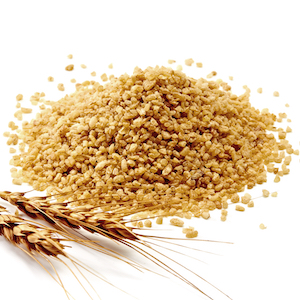 Item Code: 129
Item Code: 129
Whole Wheat Couscous are small circular round steamed balls of durum wheat semolina. That are typical around .16 inches in diameter and cook in average around 10 minutes. This whole wheat version of couscous is more nutritious than the regular variety as it is made from whole wheat durum flour and contains more fiber. Couscous is excellent for salads, side dishes or as a stuffing.
Ingredients: Organic Durum Whole Wheat Semolina
Nutrition Information per 100 grams
| Proximates | ||
|---|---|---|
| Energy | kcal | 320 |
| Protein | g | 11 |
| Total lipid (fat) | g | 2 |
| Carbohydrate, by difference | g | 63 |
| Fiber, total dietary | g | 5 |
| Sugars, total | g | 0 |
| Minerals | ||
| Calcium, Ca | mg | 0 |
| Iron, Fe | mg | 2 |
| Potassium, K | mg | 250 |
| Sodium, Na | mg | 0 |
| Vitamins | ||
| Vitamin C, total ascorbic acid | mg | 0 |
| Folate, DFE | mcg | 20 |
| Vitamin A, IU | IU | 0 |
| Vitamin D | IU | 0 |
| Lipids | ||
| Fatty acids, total saturated | g | 0.3 |
| Fatty acids, total trans | g | 0 |
| Cholesterol | mg | 0 |

Couscous – Regular
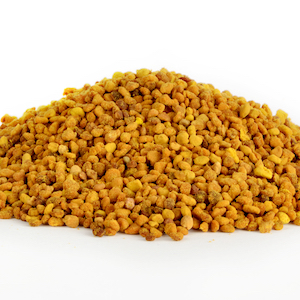 Item Code: 128
Item Code: 128
Couscous are small circular round steamed balls of durum wheat semolina. That are typical around .16 inches in diameter and cook in average around 10 minutes. Couscous is excellent for salads, side dishes or as a stuffing.
Ingredients: Organic Durum Wheat Semolina
Nutrition Information per 100 grams
| Proximates | ||
|---|---|---|
| Energy | kcal | 320 |
| Protein | g | 10 |
| Total lipid (fat) | g | 2 |
| Carbohydrate, by difference | g | 64 |
| Fiber, total dietary | g | 2 |
| Sugars, total | g | 0 |
| Minerals | ||
| Calcium, Ca | mg | 0 |
| Iron, Fe | mg | 2 |
| Potassium, K | mg | 175 |
| Sodium, Na | mg | 0 |
| Vitamins | ||
| Vitamin C, total ascorbic acid | mg | 0 |
| Folate, DFE | mcg | 20 |
| Vitamin A, IU | IU | 0 |
| Vitamin D | IU | 0 |
| Lipids | ||
| Fatty acids, total saturated | g | 0.3 |
| Fatty acids, total trans | g | 0 |
| Cholesterol | mg | 0 |

Spelt
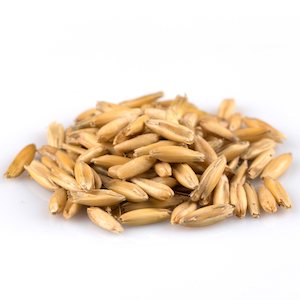 Item Code: 140
Item Code: 140
Spelt is a type of ancient grain that is a species of wheat that has been used and cultivated since approximately 5000 BC. This type of spelt has the hull removed and is ideal for making breads, salads, and soups.
Ingredients: Organic Spelt
Nutrition Information per 100 grams
| Proximates | ||
|---|---|---|
| Energy | kcal | 338 |
| Protein | g | 14.6 |
| Total lipid (fat) | g | 2.43 |
| Carbohydrate, by difference | g | 70.2 |
| Fiber, total dietary | g | 10.7 |
| Sugars, total | g | 6.82 |
| Minerals | ||
| Calcium, Ca | mg | 27 |
| Iron, Fe | mg | 4.44 |
| Magnesium, Mg | mg | 136 |
| Phosphorus, P | mg | 401 |
| Potassium, K | mg | 388 |
| Sodium, Na | mg | 8 |
| Zinc, Zn | mg | 3.28 |
| Vitamins | ||
| Vitamin C, total ascorbic acid | mg | 0 |
| Folate, DFE | mcg | 45 |
| Vitamin A, IU | IU | 10 |
| Vitamin D | IU | 0 |
| Lipids | ||
| Fatty acids, total saturated | g | 0.406 |
| Fatty acids, total monounsaturated | g | 0.445 |
| Fatty acids, total polyunsaturated | g | 1.26 |
| Fatty acids, total trans | g | 0 |
| Cholesterol | mg | 0 |

White Quinoa
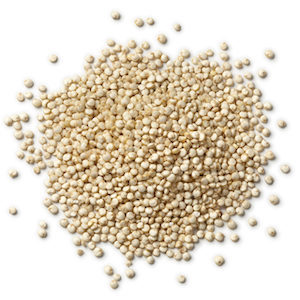 Item Code: 110
Item Code: 110
White Quinoa has a light flavor and texture and cooks up quickly. Quinoa is a small round grain around measure about 1.5 mm to 2.5mm in diameter, and about 350 seeds weigh around 1 gram.
Nutrition Information per 100 grams
| Proximates | ||
|---|---|---|
| Energy | kcal | 392 |
| Protein | g | 12.22 |
| Total lipid (fat) | g | 6.87 |
| Carbohydrate, by difference | g | 69.73 |
| Fiber, total dietary | g | 7 |
| Sugars, total | g | 0 |
| Minerals | ||
| Calcium, Ca | mg | 65.42 |
| Iron, Fe | mg | 5.06 |
| Magnesium, Mg | mg | 197 |
| Phosphorus, P | mg | 473 |
| Potassium, K | mg | 563 |
| Sodium, Na | mg | 5 |
| Zinc, Zn | mg | 3.1 |
| Vitamins | ||
| Vitamin C, total ascorbic acid | mg | 0 |
| Folate, DFE | mcg | 184 |
| Vitamin A, IU | IU | 14 |
| Vitamin D | IU | 0 |
| Lipids | ||
| Fatty acids, total saturated | g | 0.706 |
| Fatty acids, total monounsaturated | g | 1.613 |
| Fatty acids, total polyunsaturated | g | 3.292 |
| Fatty acids, total trans | g | 0 |
| Cholesterol | mg | 0 |

Tricolor Quinoa
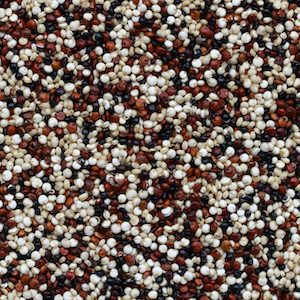 Item Code: 134
Item Code: 134
Tricolor Quinoa consists of small red, black, and tan seeds approximately 1.6-2.5mm in size. These seeds have a light flavor and texture and cooks up quickly. Tricolor quinoa is a great alternative to rice.
Nutrition Information per 100 grams
| Proximates | ||
|---|---|---|
| Energy | kcal | 392 |
| Protein | g | 12.22 |
| Total lipid (fat) | g | 6.87 |
| Carbohydrate, by difference | g | 69.73 |
| Fiber, total dietary | g | 7 |
| Sugars, total | g | 0 |
| Minerals | ||
| Calcium, Ca | mg | 65.42 |
| Iron, Fe | mg | 5.06 |
| Magnesium, Mg | mg | 197 |
| Phosphorus, P | mg | 473 |
| Potassium, K | mg | 563 |
| Sodium, Na | mg | 5 |
| Zinc, Zn | mg | 3.1 |
| Vitamins | ||
| Vitamin C, total ascorbic acid | mg | 0 |
| Folate, DFE | mcg | 184 |
| Vitamin A, IU | IU | 14 |
| Vitamin D | IU | 0 |
| Lipids | ||
| Fatty acids, total saturated | g | 0.706 |
| Fatty acids, total monounsaturated | g | 1.613 |
| Fatty acids, total polyunsaturated | g | 3.292 |
| Fatty acids, total trans | g | 0 |
| Cholesterol | mg | 0 |

Red Quinoa
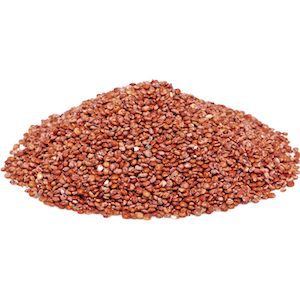 Item Code: 119
Item Code: 119
Red Quinoa consists of small red seeds approximately 1.6-2.5mm in size. These seeds have a light flavor and texture and cooks up quickly. Tricolor quinoa is a great alternative to rice.
Nutrition Information per 100 grams
| Proximates | ||
|---|---|---|
| Energy | kcal | 392 |
| Protein | g | 12.22 |
| Total lipid (fat) | g | 6.87 |
| Carbohydrate, by difference | g | 69.73 |
| Fiber, total dietary | g | 7 |
| Sugars, total | g | 0 |
| Minerals | ||
| Calcium, Ca | mg | 65.42 |
| Iron, Fe | mg | 5.06 |
| Magnesium, Mg | mg | 197 |
| Phosphorus, P | mg | 473 |
| Potassium, K | mg | 563 |
| Sodium, Na | mg | 5 |
| Zinc, Zn | mg | 3.1 |
| Vitamins | ||
| Vitamin C, total ascorbic acid | mg | 0 |
| Folate, DFE | mcg | 184 |
| Vitamin A, IU | IU | 14 |
| Vitamin D | IU | 0 |
| Lipids | ||
| Fatty acids, total saturated | g | 0.706 |
| Fatty acids, total monounsaturated | g | 1.613 |
| Fatty acids, total polyunsaturated | g | 3.292 |
| Fatty acids, total trans | g | 0 |
| Cholesterol | mg | 0 |

Black Quinoa
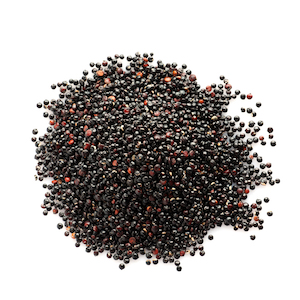 Item Code: 142
Item Code: 142
Black Quinoa consists of small red seeds approximately 1.6-2.5mm in size. These seeds have a light flavor and texture and cooks up quickly. Black quinoa in comparison to other types of quinoa has an earthly Black quinoa is a great alternative to rice.
Nutrition Information per 100 grams
| Proximates | ||
|---|---|---|
| Energy | kcal | 392 |
| Protein | g | 12.22 |
| Total lipid (fat) | g | 6.87 |
| Carbohydrate, by difference | g | 69.73 |
| Fiber, total dietary | g | 7 |
| Sugars, total | g | 0 |
| Minerals | ||
| Calcium, Ca | mg | 65.42 |
| Iron, Fe | mg | 5.06 |
| Magnesium, Mg | mg | 197 |
| Phosphorus, P | mg | 473 |
| Potassium, K | mg | 563 |
| Sodium, Na | mg | 5 |
| Zinc, Zn | mg | 3.1 |
| Vitamins | ||
| Vitamin C, total ascorbic acid | mg | 0 |
| Folate, DFE | mcg | 184 |
| Vitamin A, IU | IU | 14 |
| Vitamin D | IU | 0 |
| Lipids | ||
| Fatty acids, total saturated | g | 0.706 |
| Fatty acids, total monounsaturated | g | 1.613 |
| Fatty acids, total polyunsaturated | g | 3.292 |
| Fatty acids, total trans | g | 0 |
| Cholesterol | mg | 0 |

Oat Bran
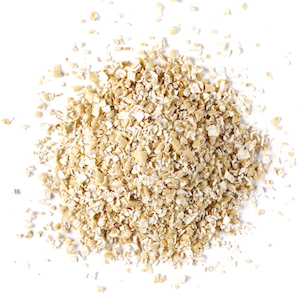 Item Code: 117
Item Code: 117
Oat Bran is a mature seed from the oat plant that has been de-hulled, milled and the bran has been separated. The oat bran is the outer layer of the oat groat. These are packed with antioxidants, fiber, and good carbohydrates. Oat bran can be used to make muffins, cereal, cakes, and breads.
Ingredients: Organic Oat Bran
Nutrition Information per 100 grams
| Proximates | ||
|---|---|---|
| Energy | kcal | 1030 |
| Protein | g | 17.3 |
| Total lipid (fat) | g | 7.03 |
| Carbohydrate, by difference | g | 66.2 |
| Fiber, total dietary | g | 15.4 |
| Sugars, total | g | 1.45 |
| Minerals | ||
| Calcium, Ca | mg | 58 |
| Iron, Fe | mg | 5.41 |
| Magnesium, Mg | mg | 235 |
| Phosphorus, P | mg | 734 |
| Potassium, K | mg | 566 |
| Sodium, Na | mg | 4 |
| Zinc, Zn | mg | 3.11 |
| Vitamins | ||
| Vitamin C, total ascorbic acid | mg | 0 |
| Folate, DFE | mcg | 52 |
| Vitamin A, IU | IU | 0 |
| Vitamin D | IU | 0 |
| Lipids | ||
| Fatty acids, total saturated | g | 1.33 |
| Fatty acids, total monounsaturated | g | 2.38 |
| Fatty acids, total polyunsaturated | g | 2.77 |
| Fatty acids, total trans | g | 0 |
| Cholesterol | mg | 0 |

Oats Groats
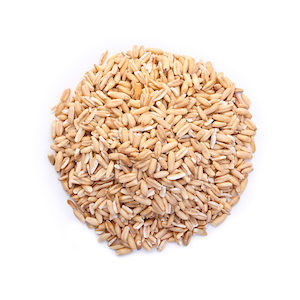 Item Code: 115
Item Code: 115
Oat Groats are only milled to remove the outer husk and is the purest form of the grain. These oat groats are rich in antioxidants, soluble fiber, and are an excellent source of carbohydrates.

Rolled Oats
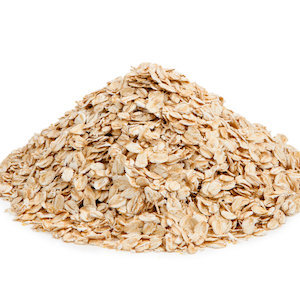 Item Code: 114
Item Code: 114
Rolled Oats commonly known as old fashion oats are oats that have been steamed, dehusked, and rolled to become flat. Traditional whole rolled oats and range in size from 0.4 mm to 1 mm. These oats provide an excellent source of soluble fiber and healthy carbohydrates for lasting energy.
Ingredients: Organic Oats
Nutrition Information per 100 grams
| Proximates | ||
|---|---|---|
| Energy | kcal | 379 |
| Protein | g | 13.2 |
| Total lipid (fat) | g | 6.52 |
| Carbohydrate, by difference | g | 67.7 |
| Fiber, total dietary | g | 10.1 |
| Sugars, total | g | 0.99 |
| Minerals | ||
| Calcium, Ca | mg | 52 |
| Iron, Fe | mg | 4.25 |
| Magnesium, Mg | mg | 138 |
| Phosphorus, P | mg | 410 |
| Potassium, K | mg | 362 |
| Sodium, Na | mg | 6 |
| Zinc, Zn | mg | 3.64 |
| Vitamins | ||
| Vitamin C, total ascorbic acid | mg | 0 |
| Folate, DFE | mcg | 32 |
| Vitamin A, IU | IU | 0 |
| Vitamin D | IU | 0 |
| Lipids | ||
| Fatty acids, total saturated | g | 1.11 |
| Fatty acids, total monounsaturated | g | 1.98 |
| Fatty acids, total polyunsaturated | g | 2.3 |
| Fatty acids, total trans | g | 0 |
| Cholesterol | mg | 0 |

Quick Oats
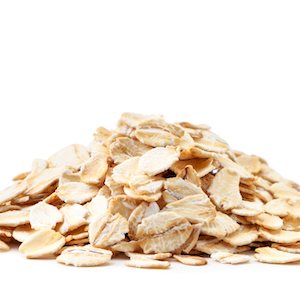 Item Code: 113
Item Code: 113
Quick Oats have a shorter cutting time than any other kind of oats. As a result, these oats are cut smaller to around .4 to .7mm. These oats provide an excellent source of soluble fiber and healthy carbohydrates for lasting energy.
Ingredients: Organic Oats
Nutrition Information per 100 grams
| Proximates | ||
|---|---|---|
| Energy | kcal | 379 |
| Protein | g | 13.2 |
| Total lipid (fat) | g | 6.52 |
| Carbohydrate, by difference | g | 67.7 |
| Fiber, total dietary | g | 10.1 |
| Sugars, total | g | 0.99 |
| Minerals | ||
| Calcium, Ca | mg | 52 |
| Iron, Fe | mg | 4.25 |
| Magnesium, Mg | mg | 138 |
| Phosphorus, P | mg | 410 |
| Potassium, K | mg | 362 |
| Sodium, Na | mg | 6 |
| Zinc, Zn | mg | 3.64 |
| Vitamins | ||
| Vitamin C, total ascorbic acid | mg | 0 |
| Folate, DFE | mcg | 32 |
| Vitamin A, IU | IU | 0 |
| Vitamin D | IU | 0 |
| Lipids | ||
| Fatty acids, total saturated | g | 1.11 |
| Fatty acids, total monounsaturated | g | 1.98 |
| Fatty acids, total polyunsaturated | g | 2.3 |
| Fatty acids, total trans | g | 0 |
| Cholesterol | mg | 0 |

Steel Cut Oats
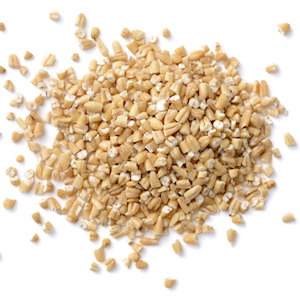 Item Code: 116
Item Code: 116
Steel Cut Oats come from chopped whole oat groats, the inner kernel of the inedible hull of the grain stalk. They are cut into pinhead-sized pieces by steel blades (hence the name), which helps give cooked steel-cut oats a courser texture than rolled oats.
Ingredients: Organic Oats
Nutrition Information per 100 grams
| Proximates | ||
|---|---|---|
| Energy | kcal | 381 |
| Protein | g | 12.5 |
| Total lipid (fat) | g | 5.8 |
| Carbohydrate, by difference | g | 69.8 |
| Fiber, total dietary | g | 12 |
| Sugars, total | g | 1 |
| Minerals | ||
| Calcium, Ca | mg | 51 |
| Iron, Fe | mg | 3.8 |
| Magnesium, Mg | mg | 129 |
| Phosphorus, P | mg | 417 |
| Potassium, K | mg | 376 |
| Sodium, Na | mg | 2 |
| Zinc, Zn | mg | 2.84 |
| Vitamins | ||
| Vitamin C, total ascorbic acid | mg | 0 |
| Folate, DFE | mcg | 30 |
| Vitamin A, IU | IU | 0 |
| Vitamin D | IU | 0 |
| Lipids | ||
| Fatty acids, total saturated | g | 1.01 |
| Fatty acids, total trans | g | 0 |
| Cholesterol | mg | 0 |

Amaranth
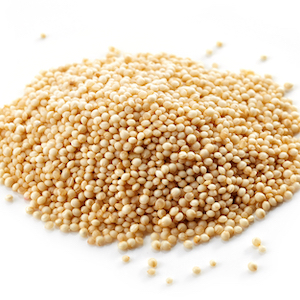 Item Code: 112
Item Code: 112
Amaranth is a tiny, grain-like seed that packs a big nutritional punch. Higher in protein than many other grains, it is a great gluten-free option that boasts nutrient density, thickening abilities and a mild flavor.
Ingredients: Organic Amaranth
Nutrition Information per 100 grams
| Proximates | ||
|---|---|---|
| Energy | kcal | 371 |
| Protein | g | 13.6 |
| Total lipid (fat) | g | 7.02 |
| Carbohydrate, by difference | g | 65.2 |
| Fiber, total dietary | g | 6.7 |
| Sugars, total | g | 1.69 |
| Minerals | ||
| Calcium, Ca | mg | 159 |
| Iron, Fe | mg | 7.61 |
| Magnesium, Mg | mg | 248 |
| Phosphorus, P | mg | 557 |
| Potassium, K | mg | 508 |
| Sodium, Na | mg | 4 |
| Zinc, Zn | mg | 2.87 |
| Vitamins | ||
| Vitamin C, total ascorbic acid | mg | 4.2 |
| Folate, DFE | mcg | 82 |
| Vitamin A, IU | IU | 2 |
| Vitamin D | IU | 0 |
| Lipids | ||
| Fatty acids, total saturated | g | 1.46 |
| Fatty acids, total monounsaturated | g | 1.68 |
| Fatty acids, total polyunsaturated | g | 2.78 |
| Fatty acids, total trans | g | 0 |
| Cholesterol | mg | 0 |

Teff
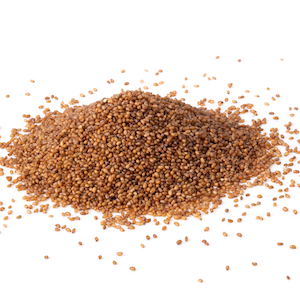 Item Code: 132
Item Code: 132
Teff is a traditional Ethiopian grain that’s rich in fiber, protein, and minerals. Its flour is quickly becoming a popular gluten-free alternative to wheat flour. It’s not as widely available as other gluten-free flours and may be more expensive.
Ingredients: Organic Teff
Nutrition Information per 100 grams
| Proximates | ||
|---|---|---|
| Energy | kcal | 367 |
| Protein | g | 13.3 |
| Total lipid (fat) | g | 2.38 |
| Carbohydrate, by difference | g | 73.1 |
| Fiber, total dietary | g | 8 |
| Sugars, total | g | 1.84 |
| Minerals | ||
| Calcium, Ca | mg | 180 |
| Iron, Fe | mg | 7.63 |
| Magnesium, Mg | mg | 184 |
| Phosphorus, P | mg | 429 |
| Potassium, K | mg | 427 |
| Sodium, Na | mg | 12 |
| Zinc, Zn | mg | 3.63 |
| Vitamins | ||
| Vitamin C, total ascorbic acid | mg | 0 |
| Vitamin A, IU | IU | 9 |
| Vitamin D | IU | 0 |
| Lipids | ||
| Fatty acids, total saturated | g | 0.449 |
| Fatty acids, total monounsaturated | g | 0.589 |
| Fatty acids, total polyunsaturated | g | 1.07 |
| Fatty acids, total trans | g | 0 |
| Cholesterol | mg | 0 |

Hard Red Spring Wheat (HRS)
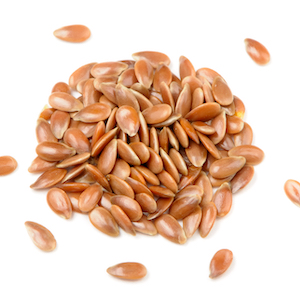 Item Code: 121
Item Code: 121
Hard Red Spring Wheat has a reddish colored husk and produces a slightly darker flour than a white wheat. Spring wheat tends to have more gluten content than the more common winter wheat varieties. Reds are generally considered more nutty or bitter than their white wheat counterparts.
Ingredients: Organic HRS Wheat
Nutrition Information per 100 grams
| Proximates | ||
|---|---|---|
| Energy | kcal | 329 |
| Protein | g | 15.4 |
| Total lipid (fat) | g | 1.92 |
| Carbohydrate, by difference | g | 68 |
| Fiber, total dietary | g | 12.2 |
| Sugars, total | g | 0.41 |
| Minerals | ||
| Calcium, Ca | mg | 25 |
| Iron, Fe | mg | 3.6 |
| Magnesium, Mg | mg | 124 |
| Phosphorus, P | mg | 332 |
| Potassium, K | mg | 340 |
| Sodium, Na | mg | 2 |
| Zinc, Zn | mg | 2.78 |
| Vitamins | ||
| Vitamin C, total ascorbic acid | mg | 0 |
| Folate, DFE | mcg | 43 |
| Vitamin A, IU | IU | 9 |
| Vitamin D | IU | 0 |
| Lipids | ||
| Fatty acids, total saturated | g | 0.314 |
| Fatty acids, total monounsaturated | g | 0.303 |
| Fatty acids, total polyunsaturated | g | 0.765 |
| Fatty acids, total trans | g | 0 |
| Cholesterol | mg | 0 |

Hard Red Winter Wheat (HRW)
Hard Red Wheat is a versatile wheat with excellent milling and baking characteristics for pan breads. Principally used to make bread flour, HRW is also a choice wheat for Asian noodles, hard rolls, flat breads and as a blending improver.
Ingredients: Organic HRW Wheat
Nutrition Information per 100 grams
| Proximates | ||
|---|---|---|
| Energy | kcal | 327 |
| Protein | g | 12.6 |
| Total lipid (fat) | g | 1.54 |
| Carbohydrate, by difference | g | 71.2 |
| Fiber, total dietary | g | 12.2 |
| Sugars, total | g | 0.41 |
| Minerals | ||
| Calcium, Ca | mg | 29 |
| Iron, Fe | mg | 3.19 |
| Magnesium, Mg | mg | 126 |
| Phosphorus, P | mg | 288 |
| Potassium, K | mg | 363 |
| Sodium, Na | mg | 2 |
| Zinc, Zn | mg | 2.65 |
| Vitamins | ||
| Vitamin C, total ascorbic acid | mg | 0 |
| Folate, DFE | mcg | 38 |
| Vitamin A, IU | IU | 9 |
| Vitamin D | IU | 0 |
| Lipids | ||
| Fatty acids, total saturated | g | 0.269 |
| Fatty acids, total monounsaturated | g | 0.2 |
| Fatty acids, total polyunsaturated | g | 0.627 |
| Fatty acids, total trans | g | 0 |
| Cholesterol | mg | 0 |

Soft Red Wheat (SRW)
Item Code: 144
Soft Red Winter Wheats are typically used to produce flat breads, cakes, cookies, snack foods, crackers and pastries. Soft Red Wheat is grown in more humid environments, not suited to hard wheat production from central Texas, towards the northeastern Great Lakes and east to the Atlantic.
Ingredients: Organic SRW Wheat
Nutrition Information per 100 grams
| Proximates | ||
|---|---|---|
| Energy | kcal | 331 |
| Protein | g | 10.4 |
| Total lipid (fat) | g | 1.56 |
| Carbohydrate, by difference | g | 74.2 |
| Fiber, total dietary | g | 12.5 |
| Sugars, total | g | 0.41 |
| Minerals | ||
| Calcium, Ca | mg | 27 |
| Iron, Fe | mg | 3.21 |
| Magnesium, Mg | mg | 126 |
| Phosphorus, P | mg | 493 |
| Potassium, K | mg | 397 |
| Sodium, Na | mg | 2 |
| Zinc, Zn | mg | 2.63 |
| Vitamins | ||
| Vitamin C, total ascorbic acid | mg | 0 |
| Folate, DFE | mcg | 41 |
| Vitamin A, IU | IU | 0 |
| Vitamin D | IU | 0 |
| Lipids | ||
| Fatty acids, total saturated | g | 0.289 |
| Fatty acids, total monounsaturated | g | 0.178 |
| Fatty acids, total polyunsaturated | g | 0.656 |
| Fatty acids, total trans | g | 0 |
| Cholesterol | mg | 0 |

Soft White Wheat (SWW)
Soft White Wheat is a light tan grain that is shorter in length and much plumper than hard wheats. It is an important ingredient in bakery products other than breads due to a more delicate gluten structure than hard wheats.
Ingredients: Organic SW Wheat
Nutrition Information per 100 grams
| Proximates | ||
|---|---|---|
| Energy | kcal | 340 |
| Protein | g | 10.7 |
| Total lipid (fat) | g | 1.99 |
| Carbohydrate, by difference | g | 75.4 |
| Fiber, total dietary | g | 12.7 |
| Sugars, total | g | 0.41 |
| Minerals | ||
| Calcium, Ca | mg | 34 |
| Iron, Fe | mg | 5.37 |
| Magnesium, Mg | mg | 90 |
| Phosphorus, P | mg | 402 |
| Potassium, K | mg | 435 |
| Sodium, Na | mg | 2 |
| Zinc, Zn | mg | 3.46 |
| Vitamins | ||
| Vitamin C, total ascorbic acid | mg | 0 |
| Folate, DFE | mcg | 41 |
| Vitamin A, IU | IU | 9 |
| Vitamin D | IU | 0 |
| Lipids | ||
| Fatty acids, total saturated | g | 0.368 |
| Fatty acids, total monounsaturated | g | 0.227 |
| Fatty acids, total polyunsaturated | g | 0.837 |
| Fatty acids, total trans | g | 0 |
| Cholesterol | mg | 0 |

Hard White Wheat (HWW)
Hard White Wheat is a relatively new class of wheat developed from hard red wheats. While hard white wheat has the same nutritional claims as traditional red wheats, products made from white wheat are lighter in color and sweeter in taste. Hard White is used primarily for yeast breads, hard rolls and noodles.
Ingredients: Organic HW Wheat
Nutrition Information per 100 grams
| Proximates | ||
|---|---|---|
| Energy | kcal | 342 |
| Protein | g | 11.3 |
| Total lipid (fat) | g | 1.71 |
| Carbohydrate, by difference | g | 75.9 |
| Fiber, total dietary | g | 12.2 |
| Sugars, total | g | 0.41 |
| Minerals | ||
| Calcium, Ca | mg | 32 |
| Iron, Fe | mg | 4.56 |
| Magnesium, Mg | mg | 93 |
| Phosphorus, P | mg | 355 |
| Potassium, K | mg | 432 |
| Sodium, Na | mg | 2 |
| Zinc, Zn | mg | 3.33 |
| Vitamins | ||
| Vitamin C, total ascorbic acid | mg | 0 |
| Folate, DFE | mcg | 38 |
| Vitamin A, IU | IU | 9 |
| Vitamin D | IU | 0 |
| Lipids | ||
| Fatty acids, total saturated | g | 0.277 |
| Fatty acids, total monounsaturated | g | 0.203 |
| Fatty acids, total polyunsaturated | g | 0.75 |
| Fatty acids, total trans | g | 0 |
| Cholesterol | mg | 0 |

Inquire about our wholesale offerings fROM the industry leader in organic raw ingredients.
